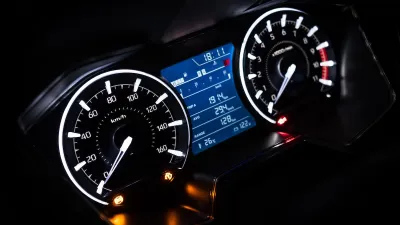Vehicle Miles Traveled (VMT) fees are a bad way to pay for roads, according to an article by Joe Cortright.

"While we desperately need a way to pay for roads that better reflects the value of the space we use, just moving to a new model isn’t enough. If we don’t get the new pricing system right, it could make many of our transportation problems worse," writes Joe Cortright.
According to Cortright, technology and consumer acceptance have advanced beyond the usefulness of the VMT fee. Instead, Cortright suggests a more holistic approach to pricing:
So as we think about how to design a road finance and pricing system to replace the gas tax (and other taxes), we ought to have a system that accounts for all the cost-drivers associated with travel: heavier vehicles that cause more road wear should pay higher fees, as should vehicles that pollute more. How much you pay to drive on a road should be related to how much that road costs to build and maintain. Use a congested urban highway at the peak hour, and you’ll pay a higher fee than if you use a rural road at 2 am.
The article critiques the VMT fee from a couple of additional angles, arguing that a VMT is unlikely to raise as much revenue as proponents of the scheme expect, and that the gas tax is already an effective carbon tax—a much more effective carbon tax than a VMT fee can be. Planetizen coverage of the first experiments with VMT fees includes stories from Oregon, Hawaii, and California. Other states could follow.
FULL STORY: An idea whose time has passed: The VMT Fee

Alabama: Trump Terminates Settlements for Black Communities Harmed By Raw Sewage
Trump deemed the landmark civil rights agreement “illegal DEI and environmental justice policy.”

Study: Maui’s Plan to Convert Vacation Rentals to Long-Term Housing Could Cause Nearly $1 Billion Economic Loss
The plan would reduce visitor accommodation by 25% resulting in 1,900 jobs lost.

Planetizen Federal Action Tracker
A weekly monitor of how Trump’s orders and actions are impacting planners and planning in America.

Wind Energy on the Rise Despite Federal Policy Reversal
The Trump administration is revoking federal support for renewable energy, but demand for new projects continues unabated.

Passengers Flock to Caltrain After Electrification
The new electric trains are running faster and more reliably, leading to strong ridership growth on the Bay Area rail system.

Texas Churches Rally Behind ‘Yes in God’s Back Yard’ Legislation
Religious leaders want the state to reduce zoning regulations to streamline leasing church-owned land to housing developers.
Urban Design for Planners 1: Software Tools
This six-course series explores essential urban design concepts using open source software and equips planners with the tools they need to participate fully in the urban design process.
Planning for Universal Design
Learn the tools for implementing Universal Design in planning regulations.
Caltrans
Smith Gee Studio
Institute for Housing and Urban Development Studies (IHS)
City of Grandview
Harvard GSD Executive Education
Toledo-Lucas County Plan Commissions
Salt Lake City
NYU Wagner Graduate School of Public Service





























